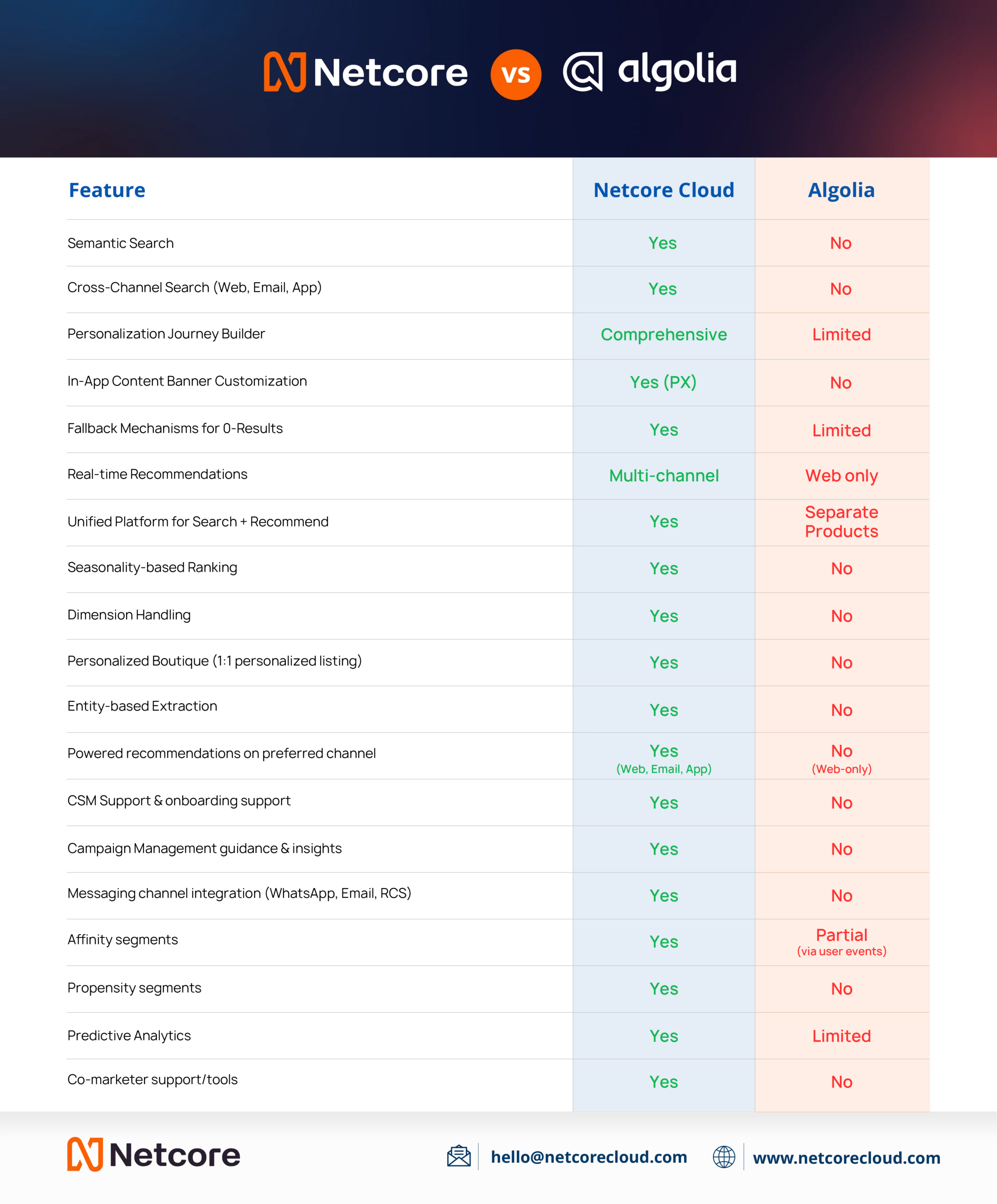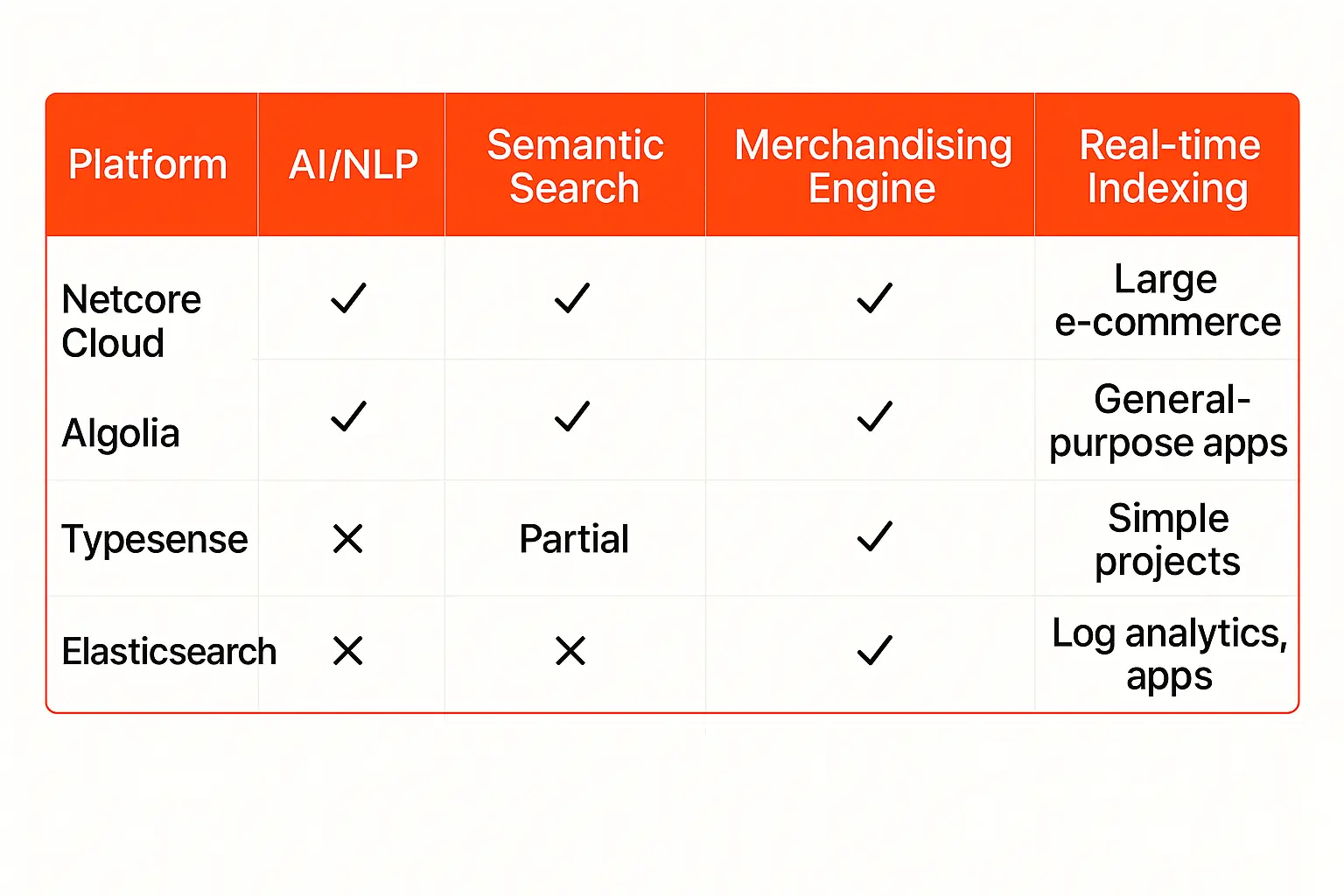In today’s hyper-competitive ecommerce landscape, a mediocre site search simply won’t cut it. Shoppers expect instant, relevant results tailored to their unique needs and preferences. Think about it – a sluggish or inaccurate search experience can directly lead to abandoned carts and lost revenue. Algolia has long been a popular choice in the realm of search-as-a-service, and it is known for its speed and robust infrastructure. However, as businesses evolve and customer expectations become more sophisticated, the limitations of even established players become apparent. This has paved the way for a new generation of search solutions, and 2026 is shaping up to be a pivotal year for Algolia alternatives. Considering alternatives to Algolia? It’s insightful to see what enterprise search engine users who chose Algolia also considered in their purchasing decisions. Leading this charge are AI-native search platforms, such as Netcore, which are redefining what’s possible with personalized and scalable search capabilities. Ready to explore the top 10 Algolia alternatives that are poised to dominate in 2026? Let’s dive in and discover the future of site search.
What to Look for in a Modern Algolia Alternative
Machine learning-based relevance tuning:
Machine learning-based relevance tuning for ecommerce search engines uses customer behavior data—such as clicks, purchases, and bounce rates—to automatically adjust and improve search result rankings. Instead of relying solely on manual rules or keyword matches, the system learns which products users find most relevant over time. This leads to more personalized, accurate results that boost conversion rates, reduce bounce rates, and enhance the overall shopping experience by adapting dynamically to user preferences and trends without constant manual updates.
Semantic Understanding (natural language)
Gone are the days of simple keyword matching. Modern shoppers expect site search to understand the intent behind their queries, not just the literal words. For example, a search for “comfy shoes for standing all day” surfaces supportive footwear like ergonomic or cushioned shoes, rather than just any “shoes.” This approach ensures better discovery, even for vague or misspelled queries, enhancing the user experience and boosting conversions on ecommerce sites.
Product Discovery & Merchandising Capabilities
For large-scale ecommerce brands, advanced product discovery ensures customers find the right products quickly across vast catalogs. AI-powered ranking, dynamic filters, and strategic merchandising rules help surface high-margin or trending items. This drives catalog visibility, reduces bounce rates, and maximizes revenue across thousands of SKUs with precision.
Developer-Friendliness and API Depth
At enterprise scale, robust, well-documented APIs enable seamless integration with complex tech stacks and custom frontends. Deep API access empowers developers to manage search logic, indexing, and personalization at scale—ensuring fast deployment, advanced customization, and consistent experiences across high-traffic, multi-category platforms with over 10,000 products.
Real-Time Indexing and Scalability
With 10K+ SKUs and constant inventory changes, real-time indexing is critical. Updates to product data, stock, or pricing reflect instantly, ensuring customers always see current information. Built-in scalability handles surges in traffic or data volume, delivering fast, reliable search performance for enterprise-grade ecommerce operations.
Zero Search Results
Ensures zero dead-ends in search by intelligently handling misspellings, synonyms, and vague queries. The system understands shopper intent and context, offering smart suggestions like “Did you mean?”, related products, and relevant alternatives. This prevents zero-result pages across catalogs with 10K+ SKUs, improving discoverability and retaining customers at every step of the journey.
Top 10 Algolia Alternatives in 2026
1. Netcore: The Best AI-Powered Algolia Alternative for Ecommerce
Overview
Netcore’s AI Search, is a self-learning, intelligent search solution designed for large-scale ecommerce businesses. It goes beyond keyword matching by understanding shopping intent, using AI, NLP, and semantic search to drive conversions and discovery.
Key Features
- AI-based search with NLP: Understands synonyms, user intent, and contextual meaning—not just keywords.
- Semantic search engine: Enables highly relevant results even with vague queries.
- Behavioral learning: Learns from clickstreams, zero-result pages, and buying behavior.
- Merchandising rules engine: Blend automation and manual control for business-driven results.
- Dynamic filters & faceted navigation: Personalizes filters based on user behavior.
- Zero results recovery: Dynamically redirects users to relevant collections.
- Instant indexing & scalability: Index millions of SKUs in real-time.
Pros of Netcore
- AI & NLP-Driven Search Relevance: Understands shopper intent, context, and semantics—resulting in more accurate, conversion-friendly results.
- Built for Ecommerce Scale: Handles catalogs with millions of SKUs, dynamic inventory updates, and real-time indexing without performance lags.
- Zero-Result Recovery & Query Intelligence: Prevents dead ends through intelligent fallback results, typo tolerance, synonym recognition, and “Did you mean?” suggestions.
- Merchandising Control + Automation: Gives merchandisers rule-based and AI-driven tools to boost product visibility and align with business goals.
- Behavioral Learning: Continuously improves relevance using clickstream data, purchase patterns, and user engagement signals.
- Integrated Product Discovery Suite: Includes faceted navigation, product recommendations, visual merchandising, and advanced analytics.
- Enterprise-Grade Support & Deployment: Trusted by large global brands with flexible deployment and high-touch onboarding.
Cons of Netcore
- Enterprise-Focused Pricing: May be overkill for small businesses or startups with basic search needs and limited product catalogs.
- Requires Onboarding for Customization: While powerful, initial setup and tuning may require collaboration with Netcore’s implementation team for optimal performance.
Not Open Source: Unlike some competitors (e.g., Meilisearch or Typesense), Netcore’s solution is proprietary, limiting developer control in open ecosystems.
Pricing of Netcore’s AI search solution
Netcore’s pricing is most suited for mid-to-large ecommerce brands looking for an enterprise-grade AI search solution with end-to-end personalization, real-time indexing, and merchandising.
Why Choose Netcore Over Algolia

2. Meilisearch
Overview
Meilisearch is an open-source, ultra-lightweight search engine optimized for developer ease. It delivers instant results and is ideal for startups and mid-size businesses needing basic full-text search with minimal setup.
Key Features
- Instant search-as-you-type experience
- Typo tolerance and prefix search
- Simple setup with a RESTful API
- Built-in support for synonyms and ranking rules
Pros
- Fast to deploy and configure
- Ideal for smaller product catalogs
- Active open-source community
Cons
- Lacks semantic understanding or AI capabilities
- Limited scalability for catalogs with 10K+ SKUs
- No built-in merchandising or behavioral learning
Pricing
Free (open-source) and commercial hosting via Meilisearch Cloud
3. Elasticsearch – Scalable, Analytics-Focused
Overview
Elasticsearch is a distributed, RESTful search engine built on Apache Lucene. It’s widely used for log analysis, search-heavy applications, and real-time analytics across massive data sets.
Key Features
- Scalable architecture for massive data volumes
- Full-text search with complex querying
- Aggregations and analytics capabilities
- Broad language and plugin support
Pros
- Handles multi-million SKU catalogs with ease
- Excellent for technical teams and custom implementations
- Flexible schema for tailored search logic
Cons
- Steep learning curve for non-developers
- Requires heavy setup and maintenance
- No native AI personalization or ecommerce focus
Pricing
Free (open-source), Elastic Cloud (paid tiered plans)
4. Typesense – Typo-Tolerant, Instant Search
Overview
Typesense is an open-source, developer-friendly search engine that focuses on simplicity, speed, and typo tolerance—delivering real-time, fuzzy search without sacrificing performance.
Key Features
- Instant typo-tolerant search
- Lightweight and fast indexing
- Simple JSON-based API
- Faceted search support
Pros
- Minimal configuration and fast performance
- Great for teams that prioritize speed and developer control
- Easy to self-host or deploy via managed cloud
Cons
- Lacks deep personalization and behavioral learning
- Not optimized for merchandising or enterprise-grade ecommerce
- Limited AI/ML capabilities
Pricing
Free (open-source) or paid cloud hosting
5. Bloomreach – Great for Omnichannel Merchants
Overview
Bloomreach combines search, content, and merchandising in one suite. Its AI-powered discovery engine is built for omnichannel retailers aiming to unify web, mobile, and in-store experiences.
Key Features
- AI-driven product discovery
- Personalization engine and recommendations
- Headless CMS integration
- Behavioral data-driven ranking
Pros
- Unified personalization across channels
- Strong marketing and merchandising tools
- Built for large retail ecosystems
Cons
- Expensive for smaller companies
- Requires integration and onboarding time
- Complex setup for developers
Pricing
Enterprise-level (custom quotes)
6. Coveo – AI Search for Enterprise Content
Overview
Coveo delivers AI-powered search and recommendations for enterprise-level digital experiences. While not ecommerce-first, it excels at aggregating content across CRM, support, and commerce systems.
Key Features
- Machine learning-driven relevance tuning
- Unified index for multiple content sources
- Personalized recommendations
- Insight analytics for search optimization
Pros
- Powerful AI features and integrations
- Ideal for content-rich environments
- Suitable for B2B and knowledge base search
Cons
- Not purpose-built for ecommerce
- Requires heavy customization for product discovery
- Higher pricing tier
Pricing
Custom enterprise plans
7. Luigi’s Box – Ecommerce Discovery Suite
Overview
Luigi’s Box offers a suite of ecommerce tools including intelligent search, product recommendations, and analytics—focused on boosting revenue through better product discovery.
Key Features
- Personalized search and recommendations
- Analytics and performance tracking
- Zero-result management and suggestions
- Visual merchandising tools
Pros
- Optimized for ecommerce needs
- User-friendly dashboard
- Works well for regional EU brands
Cons
- Limited developer flexibility
- Not as scalable for very large catalogs (10K+ SKUs)
- Pricing may increase with catalog complexity
Pricing
Tiered pricing based on usage and features
8. Apache Solr – Custom Search Indexing
Overview
Apache Solr is a mature, open-source search engine built on Lucene. It’s highly customizable, making it a go-to for enterprises needing fine-grained control over indexing and querying.
Key Features
- Rich query syntax and faceted search
- Distributed architecture for scale
- Highly configurable schema
- Enterprise-grade relevance tuning
Pros
- Full control over search logic and indexing
- Open-source and widely supported
- Scales with large catalogs and traffic
Cons
- No built-in AI or personalization features
- Requires dedicated engineering support
- Not ecommerce-specific
Pricing
Free (open-source); cost comes from hosting and development.
9. OpenSearch – Open Source Search Engine
Overview
Backed by AWS, OpenSearch is a community-driven fork of Elasticsearch. It supports log analytics and custom search use cases across a range of industries.
Key Features
- Full-text search and indexing
- Real-time dashboarding and analytics
- Plugin ecosystem
- Secure and scalable infrastructure
Pros
- AWS native integration and open governance
- Good for custom, scalable deployments
- Community-supported
Cons
- Requires configuration and maintenance
- No native ecommerce-specific features
- Limited out-of-the-box personalization
Pricing
Free (open-source) or AWS-managed service pricing
10. Constructor.io – ML-Personalized Retail Search
Overview
Constructor offers machine learning-powered search and discovery tailored for large-scale retailers. It emphasizes personalization, behavioral data, and revenue-optimized ranking.
Key Features
- ML-based ranking and personalization
- Real-time A/B testing
- Dynamic recommendations and product bundles
- Merchandising insights dashboard
Pros
- Built for enterprise retailers
- Strong focus on revenue and ROI
- Seamless integration with product catalogs
Cons
- Premium pricing tier
- May require custom integration for some platforms
- Less suited for non-retail verticals
Pricing
Custom enterprise pricing
Feature Comparison Table

Customer Success Story for AI-Powered Search
See How Did Bajaj Mall Achieve a 26% Conversion Growth with Their Game-Changing Search Powered by Netcore.
Conclusion: AI is the Future of On-site Search
In today’s high-stakes ecommerce landscape, on-site search must do more than match keywords—it must understand shopper intent, scale effortlessly, and drive measurable business outcomes. Not all search engines are built to handle the complexity of catalogs with 10K+ SKUs, real-time updates, and personalized shopping journeys.
If you’re a large-scale ecommerce brand looking to deliver intelligent, conversion-optimized search at scale, Netcore stands out as the most advanced and AI-native alternative to Algolia in 2026. It’s more than search—it’s product discovery, merchandising, and revenue performance in one unified solution.
Ready to transform your on-site search into a powerful revenue engine?
Book a personalized demo with our experts to see Netcore in action and discover how we can tailor a high-performing search strategy for your unique ecommerce business.
 Growth, decoded: Agentic Marketing Predictions 2026 for consumer markets. Read the report now.
Growth, decoded: Agentic Marketing Predictions 2026 for consumer markets. Read the report now. 












